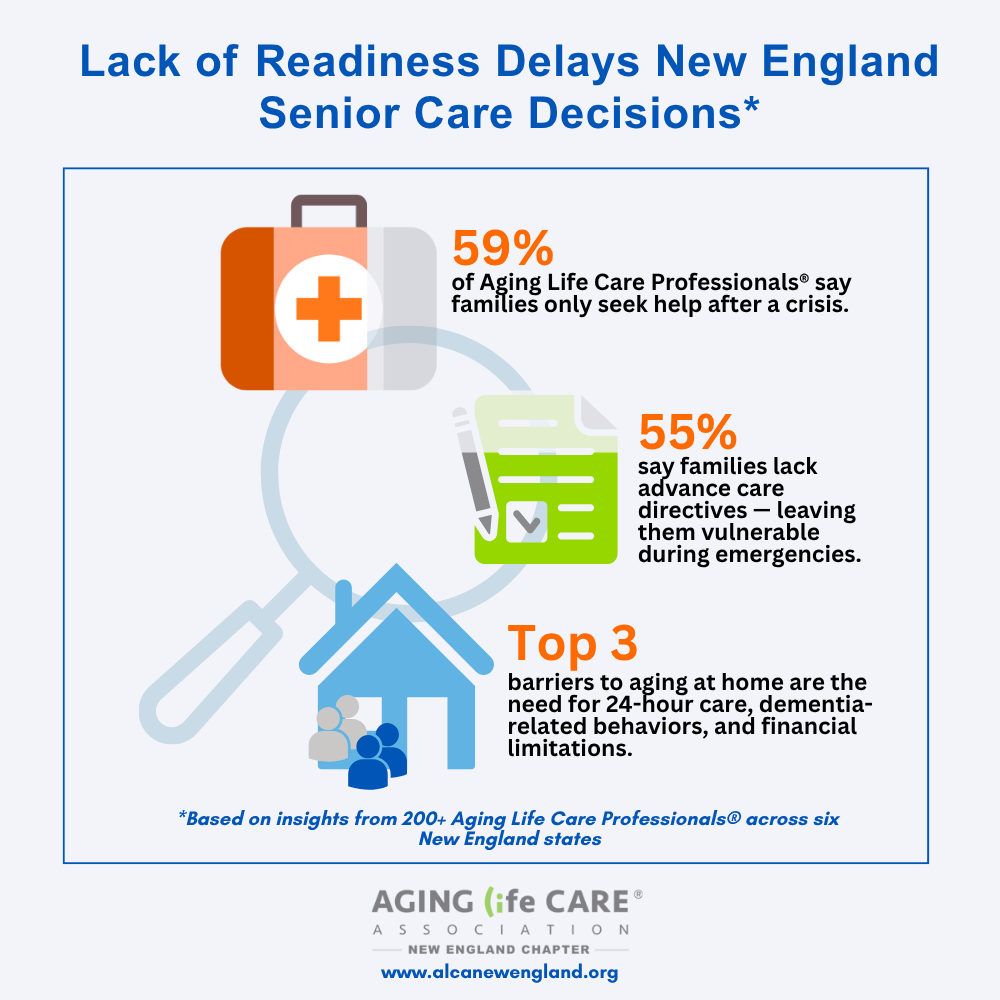
Survey Reveals Families Wait for a Crisis Before Seeking Senior Care Help
When it comes to planning for senior care, most families are waiting until it’s too late. A new survey conducted by the Aging Life Care Association® – New England Chapter reveals that the majority of families don’t reach out for professional guidance until a crisis strikes — leaving older adults and caregivers vulnerable during emergencies.
Key Findings: Families Wait Until Crisis Hits
According to the survey, 59% of Aging Life Care Professionals® report that families typically engage their services only after a serious event such as a fall, hospitalization, or medical emergency.
Even more concerning, 55% of professionals said families lack advance care directives, leaving critical medical and financial decisions unaddressed. These two findings underscore a troubling reality: too many families are reacting to crises instead of planning ahead for aging care needs.
“We often hear from seniors and families that they only seek help and advice once they are in a health crisis,” said Jennifer Pilz, MS, PT, CMC, President of ALCA NE Chapter. “Proactive planning, research, and guidance are not a priority, which can often lead to a more difficult — and much more costly — journey.”
About the Survey
The ALCA NE survey was distributed to over 200 Aging Life Care Managers® across the six New England states — Massachusetts, Rhode Island, Connecticut, Vermont, New Hampshire, and Maine. Respondents provided valuable, real-world insights into the trends, challenges, and innovations in supporting older adults, their families, and the professionals who serve them.

“Our goal was to elevate our members’ voices and share their collective expertise with aging adults, families, and the professionals who serve them,” said Pilz. “By gathering and sharing this data, we’re not only supporting our members but also informing the public about critical issues such as mental health support, caregiver resources, and home-based services.”
Why This Matters
The findings reflect what many aging life care managers see every day: families struggle to navigate the complex world of aging care. Without early planning and professional guidance, families face increased stress, higher costs, and reduced quality of care.
By highlighting these gaps, ALCA NE hopes to encourage families to act early — engaging professionals before an emergency occurs. The Chapter also plans to use the data to shape future programs, strengthen advocacy, and guide best practices within the field.
“We believe this survey strengthens regional collaboration and amplifies the voices of our members,” added Pilz. “Ultimately, it’s about helping aging adults across New England — and the U.S. — live with the dignity, independence, and quality of life they deserve.”
How to Find an Aging Life Care Manager Near You
If you’re ready to take a proactive approach to aging care—or you’re already facing a crisis—connecting with a qualified Aging Life Care Manager® is one of the most effective steps you can take. Aging Life Care Professionals® are trained experts in navigating medical, emotional, financial, and long-term care challenges. To find a professional in your area, visit the Aging Life Care Association’s searchable directory at AgingLifeCare.org.